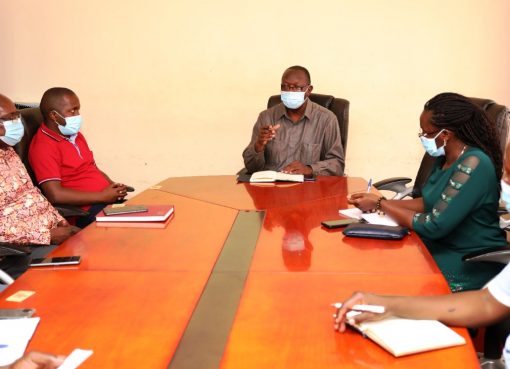Over 170 households in both Katilu and Lokapel villages in Aroo Sub-County, Turkana County, have received 856 goats and sheep.
Each household received five goats in a move geared towards restoring them to the position they were in before the adversaries of insecurity, diseases and drought reduced their livestock.
“I praise our government for this favour to most of us who almost had nothing. I now have something to provide for my family. I will take care of these animals until I become well-off like other people,” Lobar Lokui, 30, a mother of three and one of the beneficiaries from Lokapel, said.
“I have been a poor man after the neighbors drove away all my animals last year. I now have the goats to restart my life, and for this reason, may this government live long,” Eporon Awol, 45, testified.
Leading the team during the restocking exercise, the County Executive Committee Member for Agriculture, Livestock Development and Fisheries, Wangiros Longole, highlighted the commitment of the County Government in rebuilding the livelihoods of pastoralist communities across the county.
“The County Government through the Directorate of Livestock Development, is fully dedicated to rebuilding the livelihoods of pastoralists by implementing a countywide livestock restocking program, which is part of the bigger plan that aims at supporting households affected by livestock losses as a result of drought, disease, and conflict,” Longole said.
He said the program was ongoing and that it prioritized 20 high-risk areas in the county, several of which have already benefited.
Katilu and Lokapel households, Longole said, were given the first priority in the restocking exercise in order to offer immediate relief and long-term resilience to the vulnerable communities.
Additionally, the official assured residents that certified seeds will be distributed in the next two weeks to enable timely farming while urging them to intensify efforts in farming to enhance food security at household levels.
Area Member of County Assembly, who doubles as the Chair for the House Committee on Agriculture, Livestock Development and Fisheries, William Etubon, said the livestock restocking exercise in Katilu Ward was part of a Sh50 million investment plan funded out of the Ward Development Fund to boost food security.
Recognizing the need for unity of purpose, Etubon reiterated his stand to work with the Governor and entire county leadership for the benefit of the people.
Emphasizing the transparency in targeting and distribution of the restocking process, the Director of Livestock Production, Bobby Ewoi, said working with stakeholders has helped in ensuring the process was community-led and that it enhanced fairness and accountability.
Additionally, Ewoi said Katilu, Lokapel, Loyapat, Kakongu (Turkana South and Aroo), Lokosimekori, Karuko, Naukotlem, and Nakatongwa (Turkana East) and Kanang’or in Turkana North were expected to have less dependence on food aid and local livestock markets and businesses would fully emerge.
Expressing gratitude to the local leadership and the County Government, the Forty-One Champions Youth Group, contracted to supply and deliver the animals for restocking in Lokapel, was considerably impressed to be awarded the contract for the first time since its establishment.
Chair of the Group Lawrence Silale, 30, says he was conveying the group’s happiness to the county government for accepting to award the tender to supply the goats for the first time, contrary to the previous times, where well-muscled and known individual contractors benefited from the county tenders.
Present during the exercise included Josephine Emase (Deputy Director, Livestock Production), John Njuguna (Sub-County Veterinary Officer), Beatrice Atieno (Sub-County Livestock Production Officer), Mark Kotol (Katilu Ward Administrator) and a host of Village Unit administrators.
By Peter Gitonga





